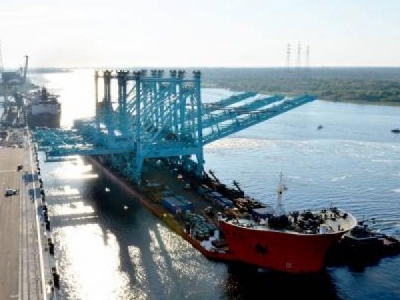
Posted on July 13, 2017
By David Bauerlein, jacksonville.com
A consultant hired by St. Johns Riverkeeper says deepening Jacksonville’s harbor to a depth of 47 feet for huge cargo containers ships from Asia would be a losing proposition that won’t deliver economic benefits justifying the steep cost of dredging.
St. Johns Riverkeeper, the non-profit that is fighting in federal court to stop the deep dredge slated to begin by early 2018, released the report Tuesday by Asaf Ashar, a research professor with the National Ports and Waterways Initiatives at the University of New Orleans.
Ashar took aim at the U.S. Army Corps of Engineers, which determined in a 2014 report that it is in the national interest to deepen the harbor because that will result in reduced transportation costs for shipping a host of goods that end up on store shelves.
St. Johns Riverkeeper Executive Director Jimmy Orth said Ashar’s report knocks out a pillar of the argument that taxpayers will get a return on investment for deepening the river, which would require $47 million to $150 million from the city along with support from the state and federal government, according to JaxPort’s financial scenarios.
“This guy is an internationally renowned expert,” Orth said.
The Jacksonville office of the Corps responded to questions about Ashar’s report by referring to the Corps lengthy analysis posted on its web site. The Corps has defended its findings in the past when challenged by Riverkeeper by saying the analysis speaks for itself.
JaxPort officials dismissed Ashar’s report.
“This is just a continuation of the Riverkeeper’s negative agenda,” JaxPort spokeswoman Nancy Rubin said. “As always, we stand by the positive economic returns — including new jobs — that will result from the deepening project.”
The Corps report, which examined the economic and environmental aspects of river deepening, resulted in Congress authorizing the project in 2014. This year, the federal government put up $21.5 million to get the project started.
The Corps report examined deepening 13 miles of river at a cost of about $684 million. The Corps latest figure for the benefit-cost ratio is that there would be $2.67 in national economic benefits for each $1 spent on the project.
But Ashar said that for each $1 spent on the project, the economic benefit will “likely” be less than $1, which makes it unfeasible because the cost of the project would be higher than the benefits.
Ashar used different data and assumption in his report than the Corps used. For instance, he said the Corps report used information about vessels from 2010 that is outdated, so he used figures from this year.
He also wrote that he disagrees with the Corps about the size of the ships that would call on Jacksonville if the ship channel stays at a 40-foot depth. Ashar said the ship that’s been described as the emerging “workhorse” for ocean-crossing trade could still call on Jacksonville while partially loaded, even if the river isn’t deepened. He also argues that the Corps didn’t examine the cargo that could continue going to Jacksonville when jumbo-sized ships cross the ocean and then offload cargo to smaller ships for delivery to East Coast ports.
Orth said the overall message of Ashar’s report is that Jacksonville’s port “still has a great opportunity to grow” without shouldering the huge cost of deepening the river in a quest to join Savannah, Ga. and Charleston, S.C. as top-tier ports.
JaxPort has said going to 47 feet is essential to the port’s vitality and if the channel stays at 40 feet, the city will lose its Asian-based trade, which is the fastest-growing piece of the port’s business. Ashar said whether Jacksonville has a 40-foot channel or a 47-foot channel, it still will be a “secondary port” behind Savannah, Charleston, Miami, Norfolk, Va., and New York.
Ashar was out of the country Tuesday and could not be reached for comment.
His web page shows he has done about 60 research projects in the past decade, mostly for government agencies, port authorities, private investors and corporations.
He has worked as an expert witness for the Natural Resources Defense Council, a non-profit environmental advocacy organization, in connection with channel deepening projects at ports in Miami and Savannah. He worked for “concerned residents” in reviewing the Corps study of deepening Palm Beach Harbor.
JaxPort recently announced the deepening would only cover 11 miles of the river at a cost of about $484 million. However, JaxPort has not asked the Corps to shorten the authorized length of the project, which still is on the books at 13 miles.
Ashar wrote that even at 11 miles, his analysis shows the project would not be economically feasible.
Bang for the buck?
A report by port consultant Asaf Ashar argues the U.S. Army Corps of Engineers erred in its analysis of deepening the St. Johns River. Here are some of Ashar’s criticisms:
– The Corps didn’t do a multiport analysis that would how Jacksonville fits in with other East Coast ports in international shipping lanes.
– The Corps used vessel data from 2010, but the makeup of global fleets has changed greatly since then.
– Even if the river stays at 40 feet, Jacksonville will still get Asian-based trade from large ships that come in partially loaded.
– Jacksonville will get Asian-based trade when mammoth ships cross the ocean and transfer cargo to smaller ships for the final leg of the trip to East Coast ports.
Source: jacksonville.com





